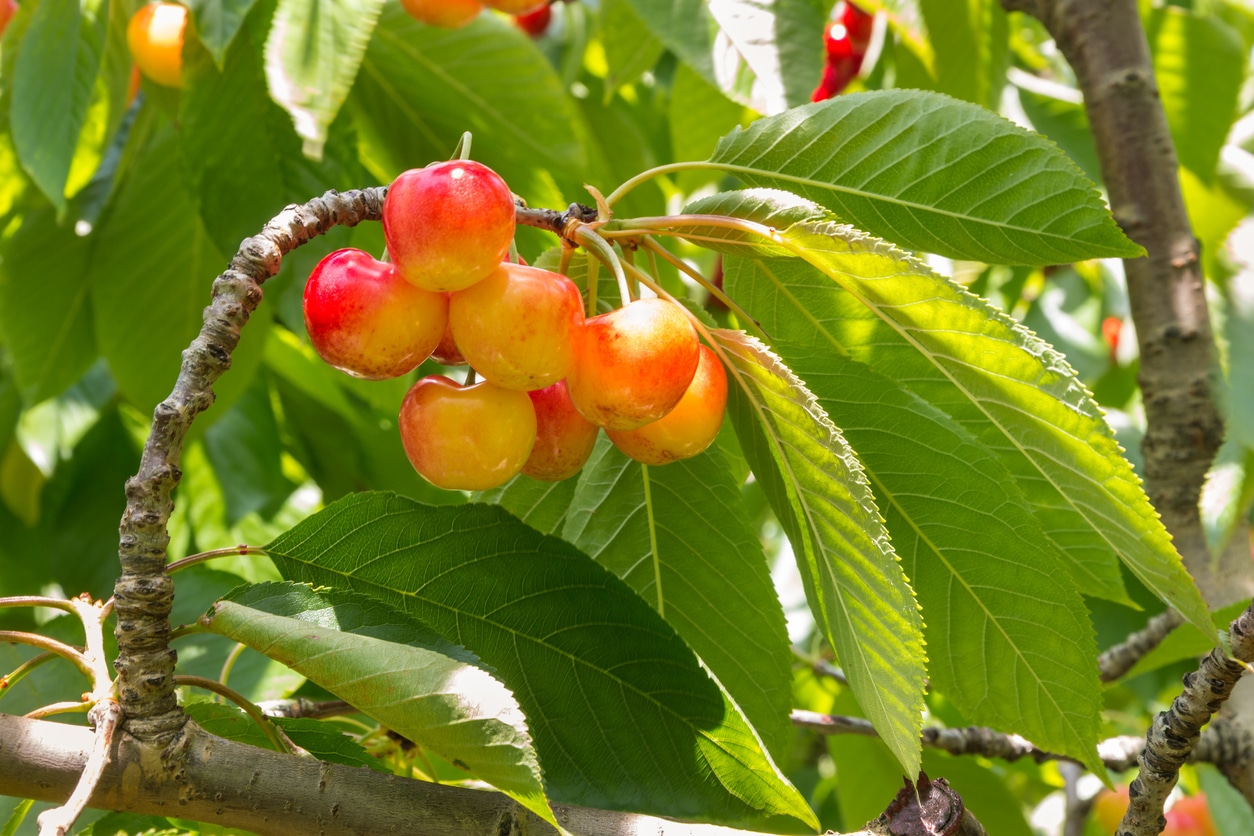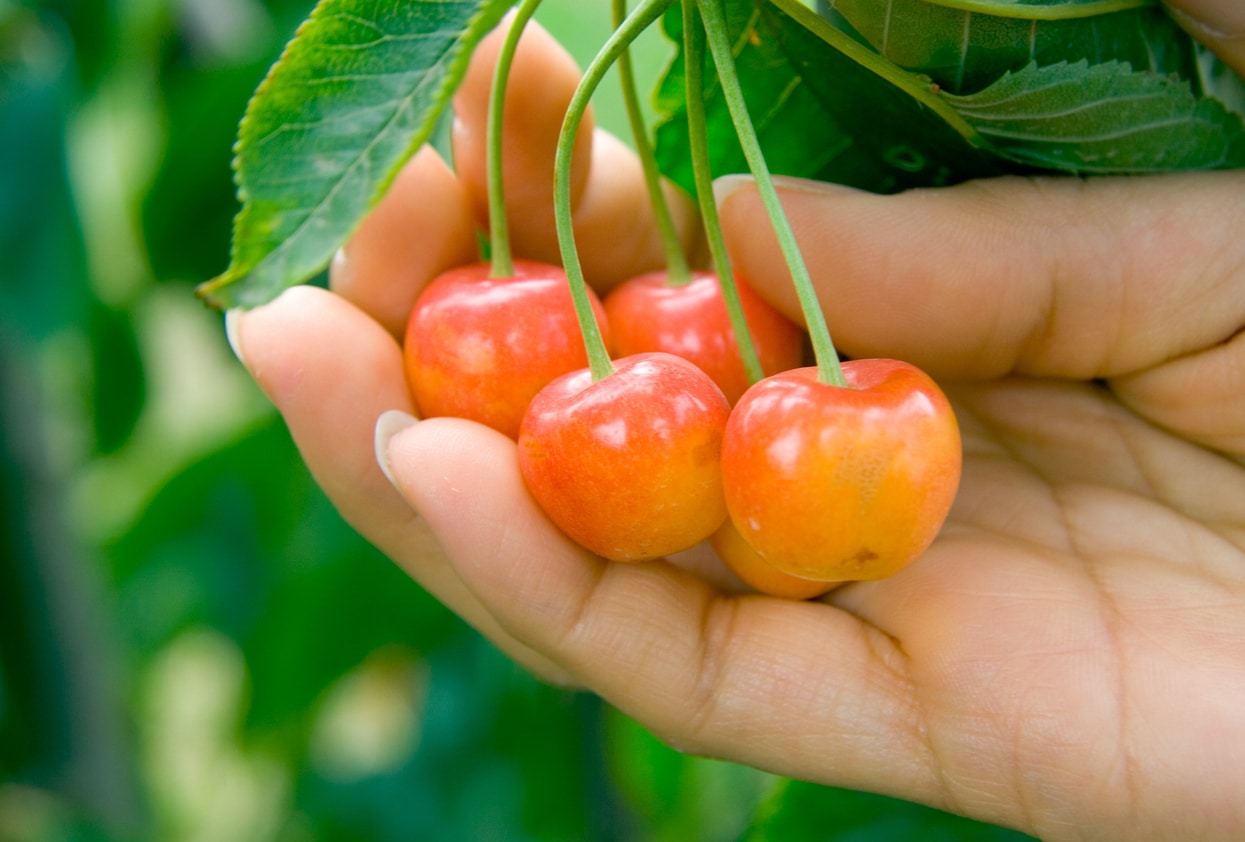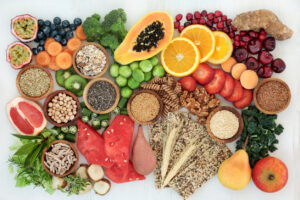Cherries, both sweet and tart, have been cherished as tasty treats for centuries. Martha Washington recorded a recipe for Cherry Bounce in the 1700s, a brandy-based cherry drink that she and her husband, George, were particularly fond of. Both clafoutis, a French treat consisting of fruit—usually cherries—in a thick crustless tart and the Roman Crostata di Ricotta and Viscioli, a cherry and ricotta tart layered in pastry, have been pleasing palates since the 1800s.
There are more than 1,000 varieties of cherries grown in the United States alone. They run the gamut from sugary-sweet to mouth-puckeringly sour. The Rainier cherry (Prunus avium) is a sweet cherry developed at Washington State University by Harold Fogle in 1952. It is a hybrid of two other popular sweet cherries: the Bing cherry and the Van cherry.
Rainier Cherries
While both parents of this cherry have skins and flesh that are deep red in hue, the Rainier cherry trees developed cherries with golden-colored skin and creamy yellow flesh. Along with their delightful color and soft, juicy flesh, Rainiers are exceptionally large and sweet, making them a sought-after delicacy. Unfortunately, they also have a somewhat short growing season and are easily damaged by heat.

While these golden delights are best known for their mighty flavor, they pack an even mightier nutritional punch. Both tart and sweet cherries have health benefits, though the amounts of specific elements vary between the two. Both are packed with antioxidants, vitamins, and beneficial hormones. They are also an excellent source of dietary fiber and reduce the amount of uric acid in the blood.
Let’s look at some of the ways that sweet Rainier cherries are a particularly beneficial addition to your diet.
Potassium
Potassium is an electrolyte mineral that is crucial to the health of the human nervous system. Sweet cherries, like the Rainier cherry, contain roughly 340 mg of potassium per cup. A potassium-rich diet helps regulate nerve impulses and fluid balance and prevent osteoporosis.
Melatonin

Melatonin is a hormone that helps to promote and regulate sleep. While the majority of our melatonin is produced in our pineal gland, we can also get melatonin from a few specific foods like milk, nuts, and cherries. While reports indicate that Montmorency tart cherries have approximately 13.5 ng/g of melatonin, ripe Rainier and Hongdeng cherries had concentrations ranging from 10 ng/g all the way up to 20.
Vitamin C

Although cherries aren’t the vitamin C heavyweights that oranges or kiwis are, they do offer a respectable 18% of the RDA per serving. Adequate vitamin C levels help your immune system by protecting cells from free radicals, which are needed for the proper growth and repair of body tissues. Vitamin C may even reduce the appearance of fine lines and wrinkles by supporting collagen production and restoring skin elasticity.
Anthocyanin
Anthocyanin is the pigment that turns cherries red, turning black raspberries black and wild blueberries blue. Research from Romania indicates that these helpful pigments can have a profound effect on human health. Their antioxidant capabilities can reduce the risk of cancer, and their anti-inflammatory activities help reduce the chances of cardiovascular disease. Rainier cherries, despite their golden coloration, contain anthocyanin, though the concentration of this compound is higher in darker cherries.
Dietary Fiber
Dietary fiber helps your digestive system function better by moving quickly and easily through the digestive tract. It contributes to the reduction of diabetes, heart disease, and obesity. Sweet cherries have a fairly impressive 3.2 grams of fiber per cup, which is .6 grams more than a cup of sliced apples.
Boron
Boron is a scarcely mentioned natural element that is vital to our health. Not only does boron help your body to metabolize key vitamins and minerals, but it may also improve both bone health and brain function. The improvement in bone health is related to boron’s role in extending the half-life of vitamin D and estrogen. This helps maintain the calcium balance in the body, reducing the chances of developing osteoporosis. Studies in the 1990s indicated that supplementation with boron improved mental functioning as well. Specifically, it improved both memory and hand-eye coordination.
Blood Sugar Benefits of Rainier Cherries
While Rainier cherries are considerably sweeter than other varieties of cherry, they have an extremely low glycemic index compared to other fruits. The natural sugars introduced to your body from eating Rainier cherries are slowly released into the bloodstream. This reduces the chance of a blood-sugar spike and subsequent crash, making the sugar from low-glycemic fruits safer for those with blood-sugar imbalances.
Reduction of Uric Acid
Gout is a painful and often debilitating form of arthritis that affects more than 8 million people in the United States. High levels of uric acid are associated with gout and can increase the number and intensity of flare-ups. Studies indicate that sweet cherries reduce the amount of uric acid in the blood, reducing the number of gout attacks. According to recent Boston University research, gout patients who ate just three servings of sweet cherries over two days reduced their chances of having a flare-up by approximately 75%.
Finding Rainier Cherries
Rainier cherries have been prized both for their exceptional coloration and flavor since their development in the 1950s. So much so that in the United States, July 11th of each year has been designated as National Rainier Cherry Day. Although these cherries are sometimes frozen for use in the winter months, they are best when consumed fresh. If you want to get your share of these sweet treasures, mark your calendars for summer. Rainier’s from California are in season from May through June, and those from Washington are available from June through August.
Read Next:
Are There Health Benefits of Drinking Red Moscato Wine?
Why You Should Start Drinking This Fruit Juice Immediately








